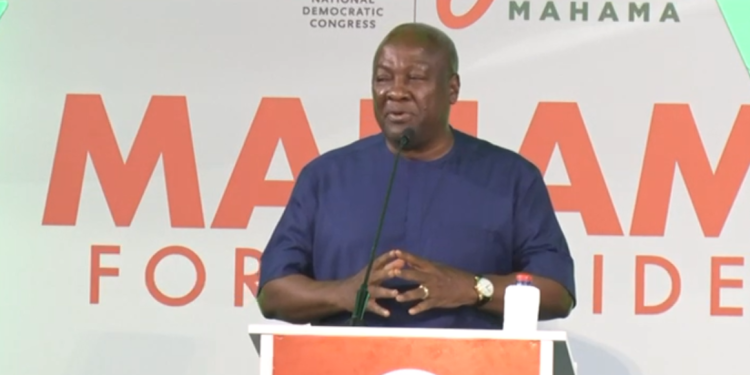National Democratic Congress (NDC) flagbearer John Dramani Mahama has voiced his stance on the ongoing parliamentary impasse, stating that he would have opted for dialogue over court proceedings to resolve the matter.

During a fellowship with clergy in Kumasi on Monday, November 11, Mahama emphasized that political disputes like these are better handled through negotiation, advocating a non-adversarial approach to address national issues.
The impasse emerged after Speaker of Parliament Alban Bagbin declared four parliamentary seats vacant, alleging that certain MPs had failed to meet constitutional requirements.
The Majority caucus, however, disputes this ruling, contending that Speaker Bagbin overstepped his authority by unilaterally vacating the seats.
This decision has sparked heated political debate, with members of the Majority accusing Bagbin of partisanship and pushing the boundaries of his constitutional mandate.
Following Bagbin’s ruling, the Majority Leader, Alexander Afenyo-Markin, filed a legal challenge with the Supreme Court, arguing that the Speaker’s action violated the rights of the affected MPs and set a troubling precedent.
In response, the Supreme Court intervened with an injunction, pausing any further actions on the seats in question until a final verdict, scheduled for Tuesday, November 12, 2024.
Mahama shared that if he were president, he would have stepped in to mediate a solution through open discussions, engaging both the Majority and Minority caucuses.
“If I were president, I would have sought to settle this matter through discussions rather than legal proceedings. I would have called both sides and settled it outside court. This is a political matter, not a legal matter,” he explained.
Mahama’s comments highlight his broader vision for addressing political conflicts through collaboration and dialogue.
He suggested that political leaders should exhaust all available options for internal resolution before resorting to the judiciary, as court battles can deepen political divisions and disrupt parliamentary functions.
The dispute over Bagbin’s ruling underscores the tensions between Ghana’s executive, legislative, and judicial branches, raising questions about checks and balances in the government.
As the Supreme Court prepares to make a final determination, Mahama’s remarks serve as a call for a more unified approach to governance, advocating for strategies that prioritize national interests over partisan divides.
























































![[FREE FREE MONEY] Predict and Win a Guaranteed GH¢200 From Us EVERY WEEK](https://wordpress.ghanatalksradio.com/wp-content/uploads/2022/02/Predict-and-Win-Final-09-03-2021-218x150.jpg)
![[Predict & Win – 8th/Oct.] WIN A Guaranteed ¢200 From Us This Week](https://wordpress.ghanatalksradio.com/wp-content/uploads/2021/10/maxresdefault-16-218x150.jpg)
![[Predict & Win – 2nd] WIN A Guaranteed ¢200 From Us This Week](https://wordpress.ghanatalksradio.com/wp-content/uploads/2021/09/maxresdefault-50-218x150.jpg)
![[Predict & Win – 25th] WIN A Guaranteed ¢200 From Us This Week](https://wordpress.ghanatalksradio.com/wp-content/uploads/2021/09/maxresdefault-36-218x150.jpg)
![[Predict & Win – 18th] WIN A Guaranteed ¢200 From Us This Week](https://wordpress.ghanatalksradio.com/wp-content/uploads/2021/09/maxresdefault-23-218x150.jpg)









![[National cathedral] See full list of churches that have contributed since 2018](https://wordpress.ghanatalksradio.com/wp-content/uploads/2020/09/Ghana-National-Cathedral-GhanaTalksRadio-100x70.jpg)


